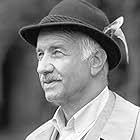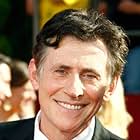AVALIAÇÃO DA IMDb
6,0/10
4,8 mil
SUA AVALIAÇÃO
Adicionar um enredo no seu idiomaWinter, 1941. World War II rages on as Nazi troops invade the Soviet Union and besiege the devastated city of Leningrad. Foreign journalists are quickly evacuated, but in the chaos that ensu... Ler tudoWinter, 1941. World War II rages on as Nazi troops invade the Soviet Union and besiege the devastated city of Leningrad. Foreign journalists are quickly evacuated, but in the chaos that ensues, Kate Davies is left behind.Winter, 1941. World War II rages on as Nazi troops invade the Soviet Union and besiege the devastated city of Leningrad. Foreign journalists are quickly evacuated, but in the chaos that ensues, Kate Davies is left behind.
- Prêmios
- 2 indicações no total
Armin Mueller-Stahl
- Fon Leeb
- (as Armin Myuller Shtal)
Gabriel Byrne
- Parker
- (as Gebriel Birn)
David Verrey
- Finli
- (as Devid Verrey)
Zhanna Nesterenko
- Sima Krasko (v detstve)...
- (as Zhanna Kostenko)
- Direção
- Roteiristas
- Elenco e equipe completos
- Produção, bilheteria e muito mais no IMDbPro
Enredo
Você sabia?
- Erros de gravaçãoDuring a briefing of Hitler by the German generals they show a map that list the city as St. Petersburg instead of Lenningrad.
- Trilhas sonorasSymphony No. 9
Written by Ludwig van Beethoven
Performed by Soloists and Orchestra Moscow Philharmonic, Conductor Wilhelm Furtwängler (as W. Furtwangler)
Avaliação em destaque
'Some fight. Others fall. All are heroes.' ATTACK ON LENINGRAD as written and directed by Aleksandr Buravsky does indeed address one of the longest and costliest sieges in the history of war. History books relate it as follows: 'This was undoubtedly the most tragic period in the history of the city, a period full of suffering and heroism. For everyone who lives in St. Petersburg the Blokada (the Siege) of Leningrad is an important part of the city's heritage and a painful memory for the population's older generations. Less than two and a half months after the Soviet Union was attacked by Nazi Germany, German troops were already approaching Leningrad. The Red Army was outflanked and on September 8 1941 the Germans had fully encircled Leningrad and the siege began. The siege lasted for a total of 900 days, from September 8 1941 until January 27 1944. The city's almost 3 million civilians (including about 400,000 children) refused to surrender and endured rapidly increasing hardships in the encircled city. Food and fuel stocks were limited to a mere 1-2 month supply, public transport was not operational and by the winter of 1941-42 there was no heating, no water supply, almost no electricity and very little food. In January 1942 in the depths of an unusually cold winter, the city's food rations reached an all time low of only 125 grams (about 1/4 of a pound) of bread per person per day. In just two months, January and February of 1942, 200,000 people died in Leningrad of cold and starvation. Despite these tragic losses and the inhuman conditions the city's war industries still continued to work and the city did not surrender.' Buravsky made a tough decision in this film - whether to sow all the tragedy of a grand scale or reduce it to an examination of the effects of this heinous event as it affected the lives of a few characters. He elected to choose the latter approach which is one reason this film stands tall among the many films about the Siege of Leningrad. Yes, there are reenactments of the battles at the beginning of the film (and the atrocities throughout the film) but Buravsky focuses on three cultures in the form of individuals - the Russians, the Germans, and the British - and is careful to present the extremes of all three groups in telling his story.
The time is 1941 and Kate Davis (Mira Sorvino) is a British journalist who pleads with fellow journalist Philip Parker (Gabriel Byrne) to be assigned to the war front. She succeeds and is assigned to Leningrad where very quickly she is separated from her confrères and is left, wounded, inside the city of Leningrad as the Germans attempt to destroy the city and conquer Russia. Kate speaks little to no Russian, is discovered by Nina Tsvetkova (Olga Sutulova), a member of the Russian resistance, and takes Kate to safety where she becomes friends with children Sima and Yura Krasko (the brother is severely handicapped), manages to write articles about the war around her when she receives a typewriter as a gift, and in general aids the Russians in surviving the lack of food an supplies and support. The film includes vignettes of the Nazi's involvement (meetings with Hitler as portrayed by Eckehard Hoffmann and Armin Mueller-Stahl as von Leeb, et al) and the Russian military and political groups to keep the action plausible. But by far the main point of the film is to honor the citizens of Leningrad as they struggled to survive - with some caring help from the outside.
The film is in Russian, German, and English with subtitles; the choice is solid for keeping the atmosphere but the mix of the three languages seems to stall the propulsion of the action in many spots. The screenplay is more concerned with depicting the sense of the event than it is in providing a dialogue of sophistication. But the actors make the best of the script: Mira Sorvino, Gabriel Byrne, and Olga Sutulova are strong enough to carry the film. This may not be the best of the films about this subject, but it is certainly one of the most successful depictions of the degree of human suffering war inflicts - and for that reason it is worthy of a larger audience.
Grady Harp
The time is 1941 and Kate Davis (Mira Sorvino) is a British journalist who pleads with fellow journalist Philip Parker (Gabriel Byrne) to be assigned to the war front. She succeeds and is assigned to Leningrad where very quickly she is separated from her confrères and is left, wounded, inside the city of Leningrad as the Germans attempt to destroy the city and conquer Russia. Kate speaks little to no Russian, is discovered by Nina Tsvetkova (Olga Sutulova), a member of the Russian resistance, and takes Kate to safety where she becomes friends with children Sima and Yura Krasko (the brother is severely handicapped), manages to write articles about the war around her when she receives a typewriter as a gift, and in general aids the Russians in surviving the lack of food an supplies and support. The film includes vignettes of the Nazi's involvement (meetings with Hitler as portrayed by Eckehard Hoffmann and Armin Mueller-Stahl as von Leeb, et al) and the Russian military and political groups to keep the action plausible. But by far the main point of the film is to honor the citizens of Leningrad as they struggled to survive - with some caring help from the outside.
The film is in Russian, German, and English with subtitles; the choice is solid for keeping the atmosphere but the mix of the three languages seems to stall the propulsion of the action in many spots. The screenplay is more concerned with depicting the sense of the event than it is in providing a dialogue of sophistication. But the actors make the best of the script: Mira Sorvino, Gabriel Byrne, and Olga Sutulova are strong enough to carry the film. This may not be the best of the films about this subject, but it is certainly one of the most successful depictions of the degree of human suffering war inflicts - and for that reason it is worthy of a larger audience.
Grady Harp
- gradyharp
- 24 de out. de 2011
- Link permanente
Principais escolhas
Faça login para avaliar e ver a lista de recomendações personalizadas
- How long is Leningrad?Fornecido pela Alexa
Detalhes
- Data de lançamento
- Países de origem
- Idiomas
- Também conhecido como
- Attack on Leningrad
- Locações de filme
- Empresas de produção
- Consulte mais créditos da empresa na IMDbPro
Bilheteria
- Orçamento
- US$ 7.000.000 (estimativa)
- Tempo de duração1 hora 50 minutos
- Cor
- Mixagem de som
- Proporção
- 2.35 : 1
Contribua para esta página
Sugerir uma alteração ou adicionar conteúdo ausente

































